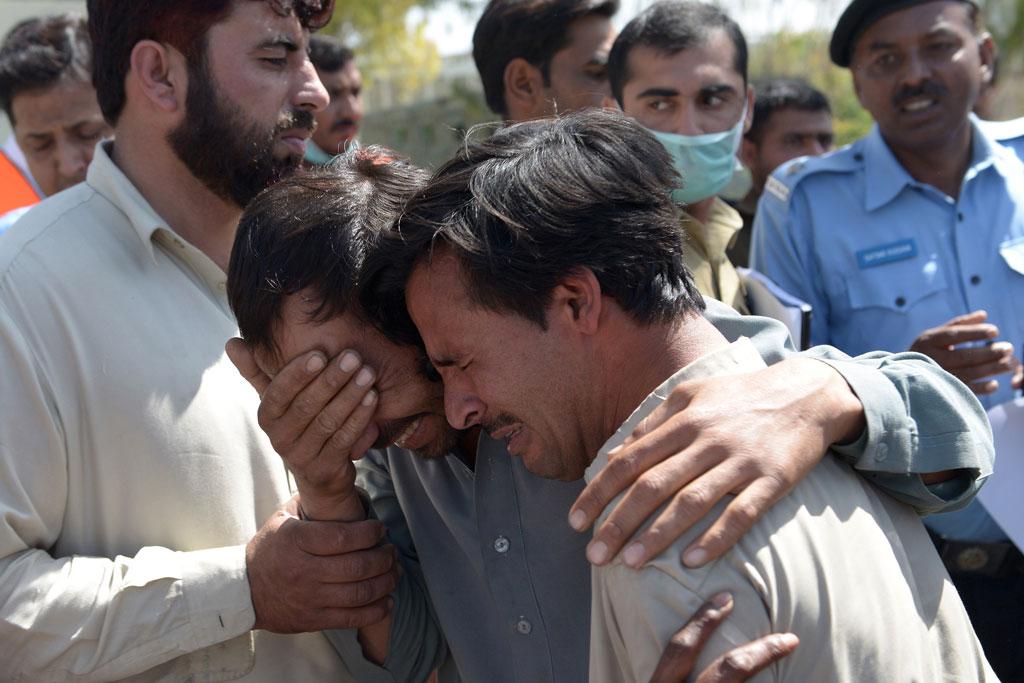The deadliest attack in years claimed 20 lives in Pakistan today
Pakistani mourners grieve the death of relatives at a hospital in Islamabad on April 9, 2014.
A bomb exploded in a crowded market on the outskirts of the Pakistani capital, Islamabad, on Wednesday, killing 20 people and injuring about 70 in the deadliest attack in the city in years.
The blast followed weeks of preliminary talks with the main Islamist militant grouping battling the state, the Pakistani Taliban, who last week extended a ceasefire until April 10.
The Pakistani Taliban denied responsibility for the early morning bomb that targeted a throng of traders assembled for fruit auctions.
Severed body parts and bloodstained clothes were scattered throughout stalls at the market between Islamabad and its twin city of Rawalpindi. Police said the bomb was hidden in a box of guava fruit.
"Body parts went everywhere and even hit other people on the head," said Shaheen, a market worker who only gave one name.
Bloody sandals lay amid boxes of straw and squashed fruit in the mud. Police waved metal detectors over boxes while dazed vendors sat in the wreckage.
Javed Akram Qazi, vice chancellor of the Pakistan Institute of Medical Sciences, said 18 bodies had been brought in to his hospital.
Another hospital had received two bodies, and about 70 people were injured, said Minister of Health Saira Afzal Tarar.
The Pakistan Taliban condemned the attack and blamed it on "hidden hands."
"The deaths of innocent people in attacks on public places are saddening," the group's spokesman, Shahidullah Shahid, said in an unusually strongly-worded statement.
"Such attacks are wrong and against Islamic law."
The Taliban regularly bomb schools, marketplaces and public transport. Authorities say they have killed tens of thousands of Pakistanis.
'Confusing people'
Information Minister Pervaiz Rashid hailed the Taliban's denial of responsibility although the militants have in the past denied attacks they, or allies linked to the loose Pakistani Taliban umbrella group of factions, have nevertheless been held responsible for.
"They have also said that those who are involved in bombing have committed a heinous crime. This shows the fast changing situation in Pakistan," Rashid told reporters at the hospital where the wounded were taken.
But Fawad Chaudhry, a lawyer and media adviser to the opposition Pakistan People's Party, said the government was simply caving in to the Taliban.
"Appeasement is letting the militants get stronger and society is getting more conservative," he said. "They are confusing people about who the enemy is."
In talks with representatives of the government, the Taliban have demanded the release of hundreds of prisoners and the withdrawal of the army from some semi-autonomous ethnic Pashtun regions where militants shelter along the border with Afghanistan.
The Taliban are fighting to overthrow Pakistan's democratically elected government and impose a strict form of Islamic law.
Pakistan is home to dozens of militant groups. Many are officially banned but nevertheless tolerated by the government in a country that has for decades seem Islamist groups as "assets" for use in the event of war with old rival India, and to pursue objectives in Afghanistan.
Some Islamists, such as the Pakistani Taliban, turned on the state after Pakistan was pressured into siding with the United States in its "war on terror" following the 9/11 attacks on US cities.
(Writing by Katharine Houreld; Editing by Ron Popeski and Robert Birsel)
The article you just read is free because dedicated readers and listeners like you chose to support our nonprofit newsroom. Our team works tirelessly to ensure you hear the latest in international, human-centered reporting every weekday. But our work would not be possible without you. We need your help.
Make a gift today to help us reach our $25,000 goal and keep The World going strong. Every gift will get us one step closer.
